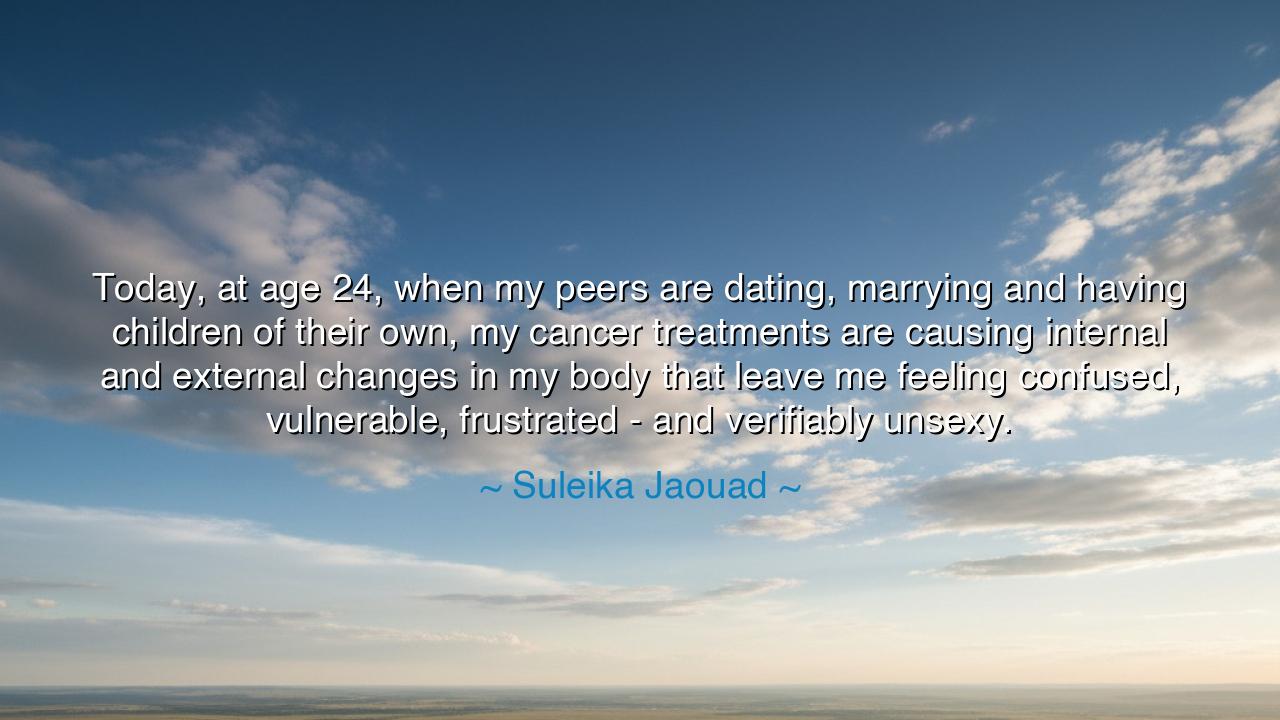
Today, at age 24, when my peers are dating, marrying and having
Today, at age 24, when my peers are dating, marrying and having children of their own, my cancer treatments are causing internal and external changes in my body that leave me feeling confused, vulnerable, frustrated - and verifiably unsexy.






“Today, at age 24, when my peers are dating, marrying and having children of their own, my cancer treatments are causing internal and external changes in my body that leave me feeling confused, vulnerable, frustrated — and verifiably unsexy.” Thus spoke Suleika Jaouad, a modern prophet of resilience, whose words, though born of suffering, ring with the clarity of truth. Her confession is not merely personal — it is the song of all who have felt left behind by life’s merciless pace, of those whose journeys have been rerouted by fate’s cruel hand. Beneath her vulnerability lies a fierce and timeless question: What becomes of identity, love, and beauty when the body — our vessel of self — is altered beyond recognition?
In the days of the ancients, suffering was often seen as a crucible — a forge through which the soul was purified, made luminous by fire. Jaouad’s words emerge from that same furnace. She speaks of confusion and vulnerability, emotions that reveal the dissonance between the inner self and the changing outer form. When illness invades the body, it is not merely flesh that suffers; it is one’s very sense of belonging in the world. While her peers build families and futures, she faces the mirror, wrestling not only with mortality but with the erosion of the self-image that once defined her. Her struggle is deeply human — the longing to be desired, to be seen as whole, even when the body bears the marks of survival.
To understand her pain is to recognize a universal truth: that the passage through suffering often separates us from the rhythm of others’ lives. In ancient times, warriors returning from battle bore scars that set them apart from the unmarked. Their injuries spoke of courage, but also of isolation. Similarly, Jaouad’s scars — invisible to some, visible to others — mark her as both victor and outcast. The “internal and external changes” she speaks of are not just physical; they are spiritual upheavals. She walks among her generation as one transformed by fire, carrying both the wisdom and the weariness that such transformation brings.
Consider the story of Frida Kahlo, the painter who turned her pain into color. Struck by tragedy and bound to a body that betrayed her, Kahlo, like Jaouad, faced the mirror and found there not ruin, but revelation. Her art was a defiance — a declaration that even the broken body could be beautiful, that suffering could give birth to truth. She, too, knew the feeling of being “verifiably unsexy,” of being denied the effortless allure of youth. Yet through her pain, she painted herself into immortality, teaching that beauty, when freed from perfection, becomes something far more sacred: authenticity.
Jaouad’s lament, then, is not one of despair but of awakening. In acknowledging her frustration, she exposes the illusion that beauty and worth are bound to the flawless body. Her words remind us that the soul does not fade when the skin changes, nor does love lose its power when youth departs. What she experiences as unsexy is, in truth, the birth of a deeper kind of beauty — one forged in courage, vulnerability, and truth. For it takes far greater strength to face oneself in frailty than to bask in the ease of health.
Let those who hear her words take heed. Do not measure your worth against the milestones of others. Life’s journey is not a race, but a pilgrimage — and each path is sacred. When illness, loss, or circumstance slows your steps, remember that slowness is not failure; it is transformation. Jaouad’s struggle is not to reclaim her old self, but to discover the new one rising from the ashes. This is the work of every soul: to accept the seasons of change with grace, to find meaning even in the unmaking.
And so, my children, let this be your lesson: that confusion, vulnerability, and frustration are not signs of weakness, but of becoming. When your body falters, or when the world moves past you, do not despair. Look within, and you will find that your spirit — though bruised — is unbreakable. True beauty is not the glow of the unscarred, but the light that emerges from those who have endured and still dare to love.
For in the end, Suleika Jaouad’s words are not about sickness, but about survival — not about loss, but about rediscovery. She teaches us that the human spirit, though tested, can find hope even in its most fragile form. The body may weaken, the mirror may change, but the heart — that eternal flame — burns on. And to walk through life with that flame still alight is, indeed, the most powerful form of beauty there is.






AAdministratorAdministrator
Welcome, honored guests. Please leave a comment, we will respond soon